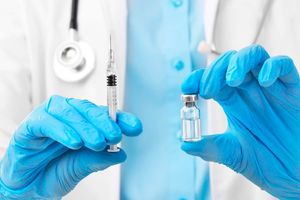From diabetes, dementia and premature death —the risks of ‘male menopause’

'Male menopause' is signaled by a decrease in testosterone levels.
What you need to know:
- A new study shows that the probability of premature deaths is five times more in men with low testosterone levels.
- They are also more likely to develop depression, dementia, and diabetes type 2. Two in every five men aged 45 years and above are believed to have low testosterone levels, the research illustrates. This can cause weight gain, extreme fatigue, night sweats and low sex drive.
When the term menopause is mentioned, the first thought that comes to mind is a woman. Menopause is generally associated with women, but have you heard about ‘male menopause’?
Just as women experience menopause, men experience ‘male menopause’ also known as andropause. Their bodies start to change and they no longer produce as much testosterone as they once did.
While menopause in women is marked by a significant drop in oestrogen hormones, “male menopause” is signaled by a decrease in testosterone levels.
Low testosterone levels have been neglected as a medical issue, according to health experts.
Not only has andropause left millions of men agonising in silence, but a drop in male sex hormones (androgen) can cause life-altering health implications in men.
A new study by the United Kingdom’s National Health Service (NHS) shows that the probability of premature deaths is five times more in men with low testosterone levels. They are also more likely to develop depression, dementia, and diabetes type 2. Two in every five men aged 45 years and above are believed to have low testosterone levels, the research illustrates. This can cause weight gain, extreme fatigue, night sweats and low sex drive.
As men get older, their testosterone levels may decline by about one per cent per year after age 30, explain the experts.
This is similar to women whose oestrogen levels start to plummet usually in their fifties during their menopause phase.
Although a natural testosterone decline in men is a rare occurrence, according to NHS, recent studies emphasise the need to focus on it.
Anxiety and stress have been proven to be the main causative factors of several symptoms linked to low levels of testosterone hormones. Some health risks attributed to low levels of testosterone in men are:
Depression
A section of scientists at NHS say there could be a correlation between low testosterone levels and depression. A group of researchers at a German-based university in 2018 reviewed 27 clinical trials aimed at establishing if symptoms of depression could be relieved through Testosterone Replacement Therapy .The review involved about 2,000 men who were split into two groups where one was given testosterone while the remaining took a placebo.
Compared to their counterparts on a placebo, men who took testosterone recorded a “significant improvement” in the symptoms of depression.
Presently, the link between depression and testosterone deficiency remains disputed since a separate research was unable to prove a relationship between the two.
Some experts argue that there could be a correlation between testosterone deficiency and depression. This is on the basis that the hormone causes increased release of neurotransmitters in the brain (dopamine responsible for the sense of pleasure and serotonin.)
They suggest a link between the function of the ‘feel good chemical’ in the brain and levels of testosterone as depressive feelings are associated with a decrease in the activity of serotonin in the brain.
Dementia
Older men with testosterone deficiency have a higher risk of developing dementia, scientists say. Researchers observed for seven years around 150,000 men aged 50 years and above, in a study published in 2022 in the journal of Alzheimer’s Association.
During the study, 826 men developed dementia. The researchers established a link between higher risk of Alzheimer’s and dementia illnesses and low levels of testosterone.
Diabetes Type 2
Men with testosterone deficiency are three times more likely to develop diabetes type 2, according to research. Regular testosterone jabs have been found to prevent the illness even in men aged 50 and above.
In a study published in 2022 in the Lancet, 1,007 men who were pre-diabetic were observed for two years. To ensure that they remained active, all the subjects were coached on diet and lifestyle and also given a gym membership.
Further, the men were split into two groups where some were put on a placebo while the other half was injected with testosterone. The risk of developing diabetes type 2 was found to be lower by 40 per cent among participants who were put on testosterone shots.
Another study conducted in 2018 showed that diabetes type 2 risk “significantly decreased” in men with higher levels of testosterone.
The risk of diabetes type 2 could increase in men with testosterone deficiency as it triggers a surge in body fat (visceral fat) which is deposited around abdominal organs.
Premature death
According to research, the risk of early death is five times more in men who are aged 40 years and above with low testosterone levels.
In a study conducted in 2006, scientists observed over 850 men aged 40 years and above for years.
According to the findings, the risk of premature death was greater by 88 per cent among men with testosterone deficiency.





